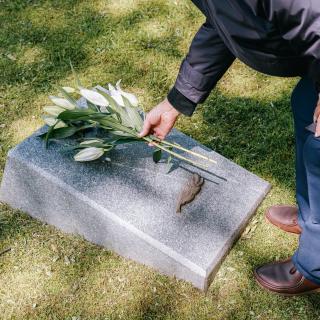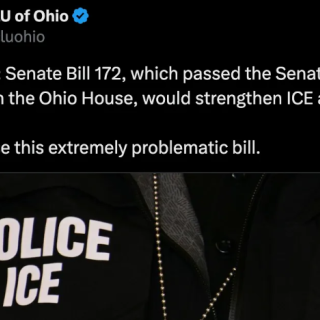Advertisement
On September 15, Mayor Ginther held a small press conference on the findings of an investigation by law firm Baker-Hostetler into allegations of misconduct by Columbus police officers. The results found CPD’s internal policy wanting for reform, but still did not live up to expectations.
This summer, as the nation reacted en masse to the gruesome police killing of George Floyd in Minneapolis, protesters found themselves not just speaking out against police brutality, but actively experiencing it as cities across the country attempted to quell the uprisings by force. In Columbus, as videos of police officers tear-gassing peaceful crowds filled social media, the city government struggled to respond.
Near the end of July, the city of Columbus entered into a contract with Cleveland law firm Baker-Hostetler, paying them $500,000 from the General Fund to independently investigate allegations of misconduct against Columbus police officers. While the firm was initially contracted to investigate 40 allegations sent either to Mayor Ginther’s office through the “report CPD” hotline or to police internal affairs, they were also directed to look into further instances of excessive force discovered during the investigation.
At the September 15th press conference, Mayor Ginther highlighted that though many of the findings were inconclusive, he believed that the initial results of the report supported a drastic need for change.
“I can tell you, I was surprised and in many cases angered at the results,” Ginther said. “Like all of you, I saw the photos, I saw the videos… the results from these investigations proved to me more clearly than ever before the need for police reform.”
Ginther stressed that the most egregious uses of force were not investigated by Baker-Hostetler, but turned over to a former FBI agent who is now investigating the allegations for possible criminal charges.
Results of the investigation were divided into five categories. In 4 cases, the officer involved was “exonerated,” meaning the conduct was within CPD policy. In 2 cases, the allegation was withdrawn by the complainant. In 9 cases, the allegation was “unfounded,” meaning Baker-Hostetler determined the alleged conduct was refuted by evidence. In 1 case an allegation was “sustained,” or found to be against CPD policy.
However, the majority of cases fell into the category “not sustained.” In these 25 cases, Baker-Hostetler partner Jennifer E. Edwards explained, the firm could not find enough information to determine whether or not there was a violation in policy. She further elaborated that almost always, this centered around an inability to determine the identity of the officer involved, because of how riot gear and gas masks obscure officers’ faces, distinguishing features, and badge numbers.
Edwards went on to explain that the investigation was often “frustrating and concerning,” with use of force reports and after-action reports frequently missing. She also said that there were limitations put on the investigation by the Fraternal Order of Police Lodge 9, which represents Columbus police officers, including a 90-day time limit on investigations.
“The collective bargaining agreement with the Fraternal Order of Police Lodge 9 creates obstacles to completing thorough investigations into allegations of officer misconduct,” Edwards said. “One of those obstacles is that it sets an arbitrary deadline of 90 days for completion of an investigation into a citizen complaint. To exceed the 90 days, the FOP must agree and is obligated not to withhold its agreement unreasonably. In this situation, where the city faced an unprecedented number of citizen complaints related to officer conduct over a very short period of time, the FOP categorically denied any and all requests to extend the deadlines in all cases, no matter what the reasons for the request.”
Police Chief Quinlan also gave comment at the press conference. While he began his statement affirming the “first amendment activities” of the summer, he went on to say that “there were clear incidents that occurred in our city that went beyond peaceful protest and in fact placed many people in harm’s way, which resulted in numerous injuries and unsettling levels of property damage,” highlighting those who “chose riots over protest.”
The report’s conclusions, and Quinlan’s comments, inspired backlash from local Black elected officials who experienced police violence firsthand during a protest this May.
Congresswoman Joyce Beatty, who was pepper sprayed by police along with Council President Shannon B. Hardin and Franklin County Commissioner Kevin Boyce, criticized the report and its presentation in a public statement.
“Peaceful demonstrations are protected under the U.S. Constitution. Period. There is no reasonable rationale for allowing, authorizing, or excusing the use of disproportionate force against lawful demonstrators,” Beatty wrote. “It is telling to me that this report in no way gives a face or a voice to the emotion or the truth of the peaceful protest that was taking place. That fateful day was peaceful until officers showed up in riot gear and proceeded to escalate the situation quickly and dramatically.”
Beatty also intimated that Baker-Hostetler’s only scope of investigation was to determine whether or not actions by police violated policy, not whether or not it was an abuse of power or if the policy was unfair, saying, “although I am extremely disappointed and strongly disagree with the report and its findings—which it is important to note were overseen and reviewed by contract law attorneys and not civil rights attorneys—all of us can agree that our community, state and nation are hurting. We can also agree that this report painfully highlights the need to pass meaningful police reform in Columbus and ensure greater accountability through the creation of an independent Inspector General and a citizen review board.”
Commissioner Boyce also took issue with Quinlan’s characterization of the protests.
“The depiction of innocent protestors as agitators is absurd and offensive,” Boyce wrote in a public statement. “We are once again witnesses to a demonstration of the deficiency and ineffectiveness of the system and how it is ultimately designed to discount and discredit. I gathered that day---to stand in solidarity on the principles of civil and social justice and denounce violence of any form. A plethora of media, including numerous video recordings of the melee have been viewed in the public realm, yet there were no findings of misconduct?”
The report of Baker-Hostetler’s investigation has not yet been published in full.
While a civilian review board is on the ballot in November, City Council has only made meager reforms addressing police violence, including putting certain limits on no-knock warrants and banning the purchase and use of certain military-grade equipment. City leaders have emphasized that changes are ongoing.



